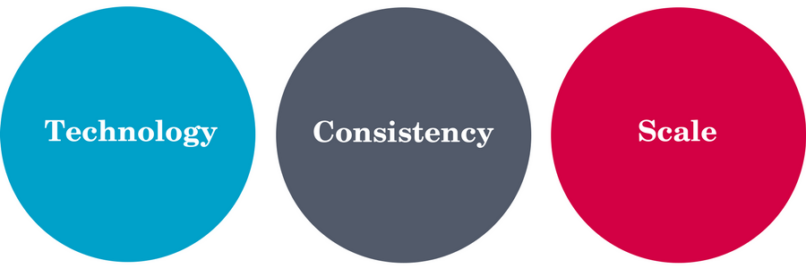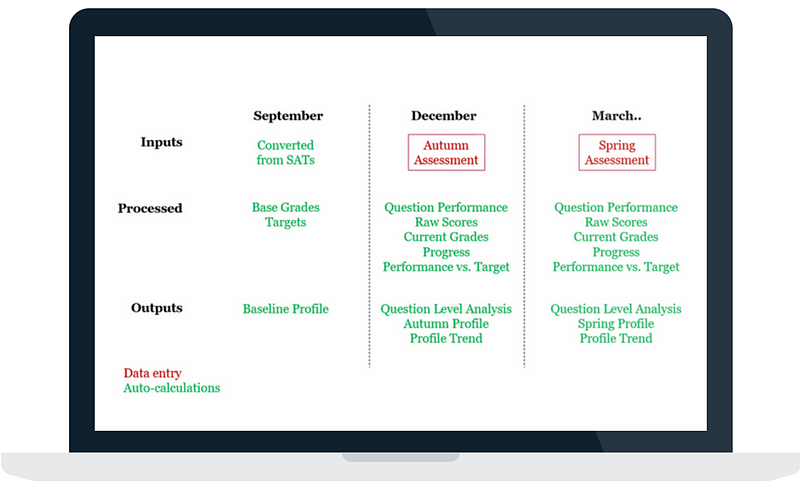This article first featured in Teach – our monthly best practice newsletter featuring tips and practical advice from Ark, our partners and our friends.
Sign up for Teach now to receive teaching tips direct to your inbox.
At Ark, we believe that great results are achieved when informed action is taken by school leaders and teachers – as well as students and their parents. We also believe that these actions should be informed by insightful analysis, which is only possible when we have accurate data.
The prevailing wisdom seems to be that if you want accurate data and insightful analyses, you need to spend lots of time and resource on these steps – which helps explain why data collection and analysis was identified as a key driver of teacher workload by the DfE’s recent review. But at Ark, we believe that we can minimise the time spent on these first two steps, leaving more time for action.
So how can we have accurate data and insightful analysis – but fast? We can’t claim to have totally cracked this yet, but it is something we are actively working on across the network. And based on what we’ve learnt so far, the following three levers can make a big difference:

In this, the first of three blogs about reducing teacher workload, we look at technology.
Getting your data system right is key to ensuring that data can be entered once but used many times. Entering data and processing it multiple times over not only increases workload, but also increases the risk of human error. It also invariably annoys everyone involved.
One option is to have a single system that covers all inputs, processing & outputs. This potentially keeps things simple, but there is an inevitable trade-off between flexibility, maintainability & scope. On one end of the spectrum, you could manage everything via Excel spreadsheets, which is an extremely flexible approach, but is likely to become more and more difficult to maintain over time. On the other hand, you could investigate ways to add modules to your MIS. The flexibility and scope of this approach is likely to be limited to at least some extent, but at least the MIS vendor and its partners should take care of a lot of the maintenance side of things.
At Ark, we opted to break this trade-off by integrating multiple systems via a data warehouse. Not all of our systems talk fluently to each other, but they all deposit data in a carefully organised central repository. This approach has multiple advantages – not least the fact that it gives us a single source of the truth. After all, any system that involves collating spreadsheets and copying/pasting values from one place to another is going to run the risk of version control issues. Another big advantage to this approach is the capacity to program in automated calculations on top of the data that has been entered. For example, when a student arrives in year 7 with SATs results, many schools will create Excel formulas and lookup tables to calculate base grades which can then be entered into the MIS. Then, later in the year, these values may be copied and pasted somewhere else so that progress can be calculated. Over the course of the year, this leads to a lot of manual manipulation of data – which really adds up across every subject in every year group in every school. But in Ark schools, nobody needs to calculate any of these things – because they are already taken care of by the system.

However, one of the biggest advantages is the ability to blend multiple different sources together into a single analysis. The health of a school cannot be solely determined by particular sets of assessment, pastoral or operational data. Rather, all of these need to be considered in tandem in order to understand what’s really going on at a school. Manually collating data from multiple systems can be extremely cumbersome and time consuming – but with a data warehouse approach, assessment data can sit happily next to Finance or HR records, making things much easier for the end user.
At Ark, we are very fortunate to have been able to develop our own internal data warehouse – something that will not be possible for all schools or small networks. However, third party data warehousing solutions are now coming onto the market that should lower the barriers to entry for more and more schools that want to take advantage of this kind of workload-reducing technology.
In our next blog we discuss how consistency can also help reduce teacher workload.

Rich Davies is Ark’s Head of Data. He splits his time between mining Ark’s data for actionable insights and developing Ark’s in-house data tools, enabling staff across the school network to develop their own data insights. Prior to joining Ark, Rich was a Strategy Consultant at the Boston Consulting Group.

Daisy Christodoulou is Head of Assessment at Ark, where she works on assessment reform, replacements for national curriculum levels and readiness for new national exams. Previously, she was Research and Development Manager at Ark. She is the author of Seven Myths about Education and Making Good Progress? The future of Assessment for Learning.